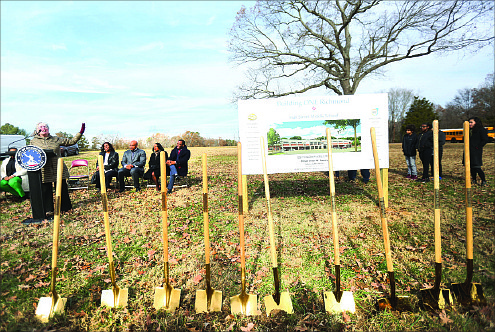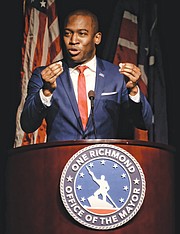$ for schools
Mayor Levar M. Stoney announces $800M plan to fully fund school construction over next 20 years
Jeremy M. Lazarus | 12/28/2018, 6 a.m.
Mayor Levar M. Stoney said it couldn’t be done.
He insisted that the funds didn’t exist to modernize most of the city’s aged public school buildings that are now falling apart.
At one point, he said there was no money hidden under the sofa cushions at City Hall. At another, he said the city didn’t have a “magic money tree.”
But with a Jan. 1 deadline looming and community groups hammering him for putting a new Coliseum ahead of school needs, Mayor Stoney reversed course.
The mayor announced a plan on Dec. 20 to provide the $800 million that Richmond Public Schools wants to improve and modernize schools, a majority of which are 60 or more years old and seven of which are 100 years old.
But under the plan, the lion’s share of the work would start after Mayor Stoney leaves office and could take up to 20 years for the work to be finished.
Despite the stretched out timetable, the plan Mayor Stoney will take to City Council in mid-January represents City Hall’s first commitment to modernize all of the city’s schools, instead of just a handful, like the four schools done in the late 1990s during the tenures of former Mayors Larry Chavis and Tim Kaine, now a U.S. senator; the four done during former Mayor Dwight C. Jones’ tenure; and the three for which Mayor Stoney and other officials just broke ground.
Mayor Stoney was elected in 2016 as the “education mayor” by pledging to improve city schools and chart a way to move forward by meeting the division’s escalating capital needs.
Under the mayor’s plan, RPS is getting a down payment on the plan of $150 million from the city’s increase in the tax on restaurant meals. That money, in part, will pay for a new Elkhardt-Thompson Middle School and two new elementary schools, George Mason and E.S.H. Greene, for which ground was broken last week and that are to open in fall 2020.
The rest of the money to improve, upgrade, renovate or replace other schools is to come from the city’s traditional general obligation bonds. As debt capacity for new borrowing is freed up as the city pays off past debt, Mayor Stoney proposes that $200 million be made available for school modernization in 2024, $212.2 million in 2029 and $237.8 million in 2034.
Richmond also would have nearly $774 million to borrow for other needs in the 20 years from 2019 to 2038, without any increase in taxes.
None of the new money would come from the proposed Navy Hill proposal that involves replacing the Richmond Coliseum, the mayor stated in his Dec. 20 news release announcing the school funding plan.
Mayor Stoney stated the plan, crafted by the city’s financial adviser, David P. Rose of Davenport & Co., represents his response to a change in the City Charter that voters passed overwhelmingly in 2017 over the mayor’s strong opposition and that won virtually unanimous support this year from the General Assembly and the governor who enacted it.
That change required Mayor Stoney to come up with a fully funded plan for fixing public schools that did not raise taxes or to explain why he could not. Once the plan is submitted, the council has 90 days to take “action it deems appropriate,” according to the charter amendment.
Mayor Stoney’s proposal represents City Hall’s first public acknowledgement of the huge impact of the referendum that was spearheaded by Paul Goldman, a longtime campaign and political strategist and former chairman of the Virginia Democratic Party, and such allies as the Richmond Crusade for Voters and the Falls of the James chapter of the Sierra Club.
“The referendum effort had and has only one public-spirited goal: Getting long-denied RVA children out of decrepit, intolerable, immoral building conditions and into clean, modern, worthy facilities necessary for a 21st century education,” Mr. Goldman wrote on Facebook after the mayor issued his announcement.
Despite getting bashed for pushing a change that the mayor and his allies variously described as “a stunt,” “a distraction,” “illegal” and “a waste of time,” Mr. Goldman noted, “I knew — as did the Richmond Crusade for Voters and the Sierra Club — that City Hall, City Council, editorial writers, columnists and the Chamber of Commerce would not do it without putting the proverbial political gun to their heads” — the overwhelming support of citizens.
Mr. Goldman said that if the city’s political and business leaders “join together to do the right thing, I will be cheering the loudest and will give them all the credit for ridding the city of the biggest monuments to segregation.”
As yet, he is not certain that the mayor’s funding proposal meets the definition of a fully funded plan that is called for under the charter. He said it also would require a list of schools to be renovated or replaced and a timetable.
“I’ll wait for the details,” Mr. Goldman said.
The mayor is to deliver the plan to City Council on Monday, Jan. 14, at the next meeting.
“We are grateful to the mayor for laying out this $800 million plan,” Richmond schools Superintendent Jason Kamras stated in a communication to the Free Press. “Every one of our building should shout, ‘We love you,’ to our students. Sadly, that’s just not the case right now. This plan will change things once and for all,” he stated.
There are skeptics, including an elementary teacher, who asked to remain anonymous.
“Although it is a very generous proposal for the schools to be fully funded for 20 years, by that time, we may need a lot more money because there are rising costs every year,” the teacher stated.
School Board Chairwoman Dawn Page, 8th District, said she’s optimistic, but wants to hear more details about the mayor’s plan. She said she “looks forward to reviewing the plan with my board colleagues and sharing our feedback with the mayor and citizens at that time.”
School Board member Jonathan Young, 4th District, said the mayor’s proposal means “it is on us, the School Board, to adopt a plan that right-sizes our capital outlay, incorporates closure and consolidation to expedite new construction and renovation, earns the support of future mayors and city councils and secures the respect of the taxpayers.”
Board member Kenya Gibson, 3rd District, called the mayor’s statement “a first step towards progress that is decades overdue.” Writing that “this is what democracy looks like,” Ms. Gibson praised voters who “believe our schools are our priority” and the Goldman team for “all their work to bring the referendum on school modernization to the voters.”
Councilwoman Kim B. Gray, 2nd District, also hailed citizens who signed petitions to get the referendum on the ballot in 2017 and those who voted for it. While she declined to comment on the mayor’s proposal before seeing the details, she stated that “as the mayor conceded, he would not have submitted the proposal without the overwhelming push from the voters.”
Staff writer Ronald E. Carrington contributed to this article.









